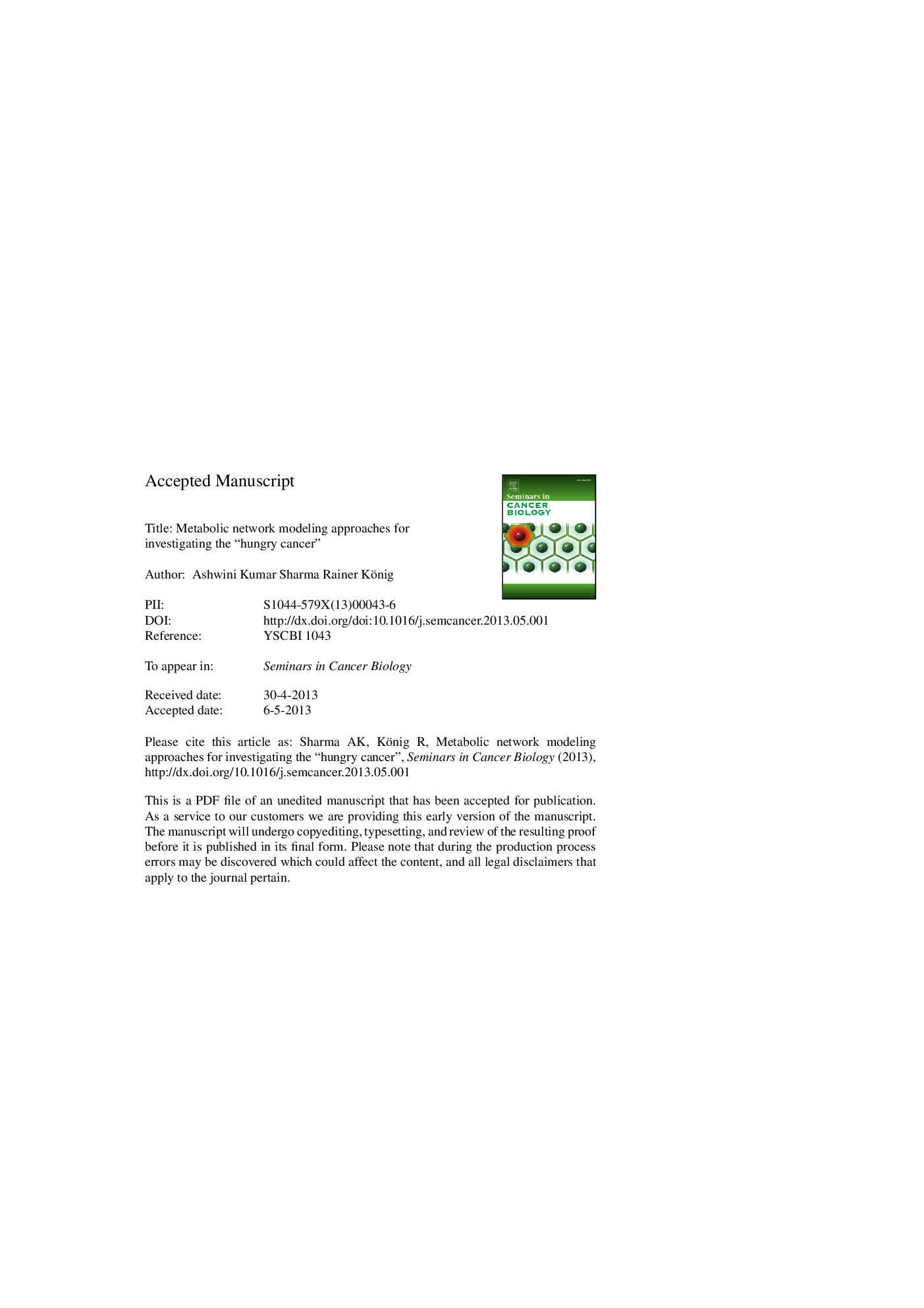| کد مقاله | کد نشریه | سال انتشار | مقاله انگلیسی | نسخه تمام متن |
|---|---|---|---|---|
| 10845620 | 1069794 | 2013 | 27 صفحه PDF | دانلود رایگان |
عنوان انگلیسی مقاله ISI
Metabolic network modeling approaches for investigating the “hungry cancer”
ترجمه فارسی عنوان
مدل سازی شبکه های متابولیک برای بررسی سرطان گرسنگی
دانلود مقاله + سفارش ترجمه
دانلود مقاله ISI انگلیسی
رایگان برای ایرانیان
کلمات کلیدی
سرطان، متابولیسم، شبکه های، مقررات، تجزیه و تحلیل تعادل شار تجزیه و تحلیل شار متابولیک، تجزیه و تحلیل الگو،
ترجمه چکیده
متابولیسم فنوتیپ کارکردی یک سلول است، در یک شرایط خاص، که منجر به تعامل پیچیده فرآیندهای تنظیم کننده ای مختلف می شود. مطالعه این پروسه های متابولیسم پویا و قابلیت های آنها به شناسایی خواص بنیادی سیستم های زندگی کمک می کند. مقررات غربالگری متابولیک یکی از نشانه های ظهور سلول های سرطانی است. این مقررات غلط ارزیابی منجر به ایجاد مجدد مدارهای متابولیک مزیت متابولیک استثنایی برای سلول های تومور می شود که منجر به منفعت متمایز در بقاء می شود و پایه ای برای پیشرفت ناخواسته را فراهم می آورد. متابولیسم را می توان به عنوان یک نظام آزاد ترمودینامیکی در نظر گرفت که در آن مبنای منبع با ارزش بالا از طریق یک سیستم تبدیل بیوشیمیایی مرتبط به هم پیوسته، به شدت زیر اصول فیزیولوژیکی، تولید واسطه های مفید و در نهایت منجر به آزاد سازی فرآورده های جانبی می شود. بر اساس این اصل اساسی توازن ورودی / خروجی، مدل های مختلف برای بررسی متابولیسم توسعه داده شده است که ویژگی های عملکردی آن را توضیح می دهد. با این حال، فقط چند روش مدل سازی ثابت شده است که در محاسبه ماهیت متابولیک سرطان در یک سطح سیستم قابل اثبات است. علاوه بر این، رویکردهای آماری برای شناسایی مسیرهای بیوشیمیایی که بیشتر مربوط به انواع خاصی از سلول های تومور هستند، تنظیم شده است. در این بررسی، ما خلاصه ای از رویکردهای آماری اساسی و مفاهیم مدل سازی اصلی را معرفی می کنیم. ما تاکید بر روش ها و برنامه های کاربردی خود را که تا حد زیادی در درک متابولیک تغییر ساختار سرطان استفاده شده است.
موضوعات مرتبط
علوم زیستی و بیوفناوری
بیوشیمی، ژنتیک و زیست شناسی مولکولی
زیست شیمی
چکیده انگلیسی
Metabolism is the functional phenotype of a cell, at a given condition, resulting from an intricate interplay of various regulatory processes. The study of these dynamic metabolic processes and their capabilities help to identify the fundamental properties of living systems. Metabolic deregulation is an emerging hallmark of cancer cells. This deregulation results in rewiring of the metabolic circuitry conferring an exploitative metabolic advantage for the tumor cells which leads to a distinct benefit in survival and lays the basis for unbound progression. Metabolism can be considered as a thermodynamic open-system in which source substrates of high value are being processed through a well established interconnected biochemical conversion system, strictly obeying physiochemical principles, generating useful intermediates and finally resulting in the release of byproducts. Based on this basic principle of an input-output balance, various models have been developed to interrogate metabolism elucidating its underlying functional properties. However, only a few modeling approaches have proved computationally feasible in elucidating the metabolic nature of cancer at a systems level. Besides this, statistical approaches have been set up to identify biochemical pathways being more relevant for specific types of tumor cells. In this review, we are briefly introducing the basic statistical approaches followed by the major modeling concepts. We have put an emphasis on the methods and their applications that have been used to a greater extent in understanding the metabolic remodeling of cancer.
ناشر
Database: Elsevier - ScienceDirect (ساینس دایرکت)
Journal: Seminars in Cancer Biology - Volume 23, Issue 4, August 2013, Pages 227-234
Journal: Seminars in Cancer Biology - Volume 23, Issue 4, August 2013, Pages 227-234
نویسندگان
Ashwini Kumar Sharma, Rainer König,
